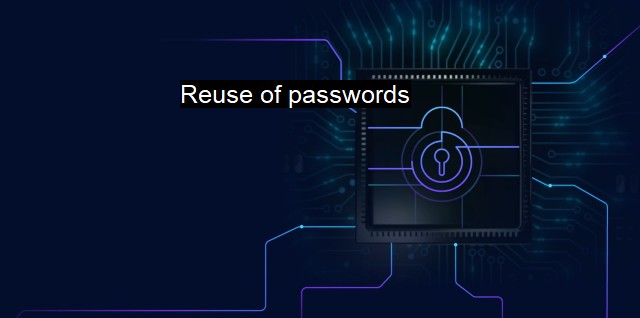What are Reuse of passwords?
Password Reuse: A Risky but Common Habit and the Security Threats It Poses in the Cyber World
The concept of reuse of passwords essentially refers to the act of using the same password for more than one account or application. This practice, also known as password recycling, is one that is highly discouraged by cybersecurity experts because it exposure users to several unfortunate security risks, with the likelihood of considerably escalating the potential repercussions of a hacker obtaining a password.The foundation of secure online transactions and interactions is in many senses, underpinned by the strength and uniqueness of the associated passwords. These confidential sequences of letters, symbols, and numbers exist to serve as barriers that fend off unauthorized access, intending to fortify the gateways to our personal information contained within digital territories. as digital landscapes continue to expand and diversify, so does the number of accounts that an average user possesses. Consequently, the user is burdened with the task of needing to manage and recall several complicated passwords, which tends to lead many down the path of opting for password reuse.
While password reuse is broadly celebrated for its convenience, enabling seamless management of multiple digital platforms, it possesses considerable vulnerabilities when examined with a cybersecurity lens. The practice has the effect of stretching a single password thin over several applications or accounts. This means if a hacker can gain access to one account, or if one account is compromised, all the accounts with that identical password are instantly jeopardized. Herein lies the serious security threat of password reuse: it drastically enhances the potential reach and damage of a single security breach.
Reuse of passwords can lead to disastrous consequences via a tactic known as credential stuffing. This tactic involves the attacker taking breached username/password combinations and using automated tools to test these combinations on other websites. With numerous individuals reusing their passwords across different online platforms, this hacking approach has a significantly high success rate, compromising personal data security and integrity.
Another perilous aspect is that cyber attackers employ sophisticated techniques to correlate different pieces of data with each other and identify patterns. Therefore, if the password to an account with low-security protocols gets compromised, cybercriminals tend not to limit their ambitions to just that platform. Recognizing the probability of password reuse, these culprits are known to try the same password on other platforms where the security measures are more robust in hope to gain access there as well.
From an antivirus context, antivirus software predominantly functions by identifying and removing malicious programs on a system. cybersecurity extends beyond just defending against viruses or malware. It is crucial to understand that no degree of advanced antivirus protection can compensate for weak password security leading to a potentially disastrous breach entirely preventable by adopting stronger password practices.
The ideal way to mitigate these risks is to use unique complex passwords for every single application or account. It is far from convenient and requires more detailed password management, but from a cybersecurity viewpoint, this limits the damage in case of an account breach. Users can also resort to password manager tools that encrypt and securely manage these unique passwords. many institutions and platforms are pushing for multi-factor authentication, where more than the mere knowledge of a password is required to grant access.
The reuse of passwords, although seemingly convenient, presents significant risks in both cybersecurity and antivirus contexts. As we immerse ourselves deeper every day into this digital age, secure password practice undoubtedly needs to become an integral part of our cyber lifestyle if we hope to maintain an acceptable level of security in our digital exchanges and interactions. Cyber threats are continually evolving, innovating, and intensifying; our lines of defense against them must evolve correspondingly, and avoiding password reuse is a small but pivotal step in the right path.

Reuse of passwords FAQs
What is the risk of reusing passwords?
Reusing passwords is a significant cybersecurity risk as it makes it easier for hackers to gain access to multiple accounts. If a hacker obtains your password for one account, they can use it to access other accounts where you may have used the same password.What can I do to prevent security breaches caused by password reuse?
To prevent security breaches caused by password reuse, you should use unique passwords for each account. The use of a password manager can help generate and manage unique passwords for each account, making it easier for you to stay secure.Is it safe to reuse passwords if I use a strong antivirus program?
Using a strong antivirus program is an essential security measure, but it does not make it safe to reuse passwords. Antivirus programs can protect you from some cybersecurity threats, but they cannot protect you from risks associated with reusing passwords.What are the consequences of reusing passwords?
The consequences of reusing passwords can be severe. If a hacker gains access to one account, they will have access to all accounts that use the same password. This can lead to identity theft, stolen financial information, and other serious security breaches. It is always best to use unique passwords for each account to reduce cybersecurity risks.| | A | | | B | | | C | | | D | | | E | | | F | | | G | | | H | | | I | | | J | | | K | | | L | | | M | |
| | N | | | O | | | P | | | Q | | | R | | | S | | | T | | | U | | | V | | | W | | | X | | | Y | | | Z | |
| | 1 | | | 2 | | | 3 | | | 4 | | | 7 | | | 8 | | |||||||